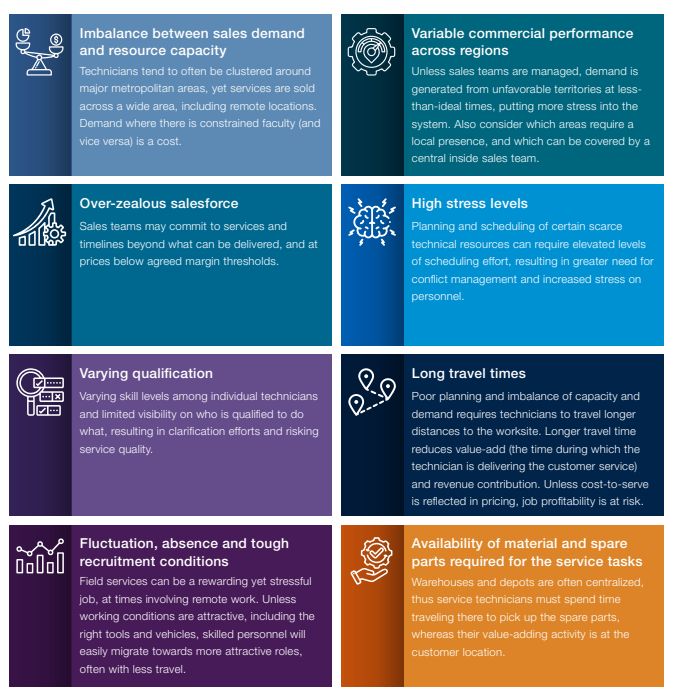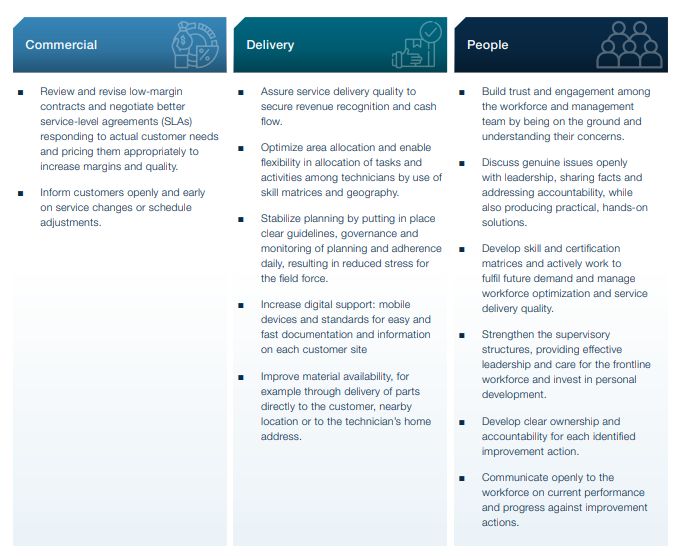- within Insolvency/Bankruptcy/Re-Structuring, Criminal Law, Litigation and Mediation & Arbitration topic(s)
Field services are an integral part of many industries. The ways in which these services are delivered have evolved at an accelerated pace in recent years, affecting frontline workers and users. Yet parts of the industry continue to face shared challenges, while further opportunities for service improvement and productivity remain.
The Covid-19 lockdowns and ensuing business and industrial disruptions emphasized the importance of field service, which refers to any service provided to clients or customers outside company premises. These operations, which could range from general maintenance and inspection services to facility management and traffic management solutions, directly represent the business, with each interaction influencing the customer's perception about the quality of service.
While the increased adoption of big data analytics, remote work and artificial intelligence (AI) tools are transforming the workplace, they cannot fully replace the essential hands-on work that field services still provide. This is fundamentally a "people business."
At Alvarez & Marsal (A&M), we are often called into situations both pre- and post-deal to advise and transform field-based services for our clients. While most clients understand the necessity for high-quality and profitable field services, it is extremely hard to get it right, given the dimensions ranging from managing client demand to geographical presence, skill and workforce management perspectives. Critical to the process of identifying improvements is understanding the complexity of the tasks and activities required, as well as local nuances and working across the entire value chain.
In this article, we will discuss the typical challenges encountered by businesses when it comes to field services and how they can be addressed. We recently worked on a client case in engineering services, which exemplified many of the common themes we come across in field-service related industries.
Common Client Challenges
We routinely see demanding situations at businesses, where several processes have not been adequately managed or conflicts between departments have been left unresolved and simmered over time. Outlined below are challenges that typically arise in fast-growth and ramp-up scenarios, when management focus has prioritized business development over managing fundamentals and structural processes.
While these may be evident to an outside observer, operational management is often pre-occupied with daily issues on hand. An external assessment triggered by, say, the due diligence process of an investor (pre-deal), or by a business transformation program (post-deal) is a typical entry point for A&M. Here are some themes to look out for:

Due to one or more of these challenges, employees lose motivation, service quality suffers and profitability slides downward. While some challenges are common in nature, every situation is unique and influencing factors will differ, which means thorough fact-finding is always needed to confirm the optimal solution for each client case
A&M's Approach
At its core, field service is a people-oriented business. It is about skilled people providing customers a physical service that cannot be delivered remotely or automated. While advising businesses on field services, we have observed that personnel often work far away from headquarters and have little contact with other colleagues. Ensuring field service staff stay engaged, motivated and are treated with respect is not just responsible business practice but crucial to keeping customers happy and profitability growing. Our approach emphasizes the personal, both through formal interactions and coaching from supervisors, combined with more informal exchanges with peers and learning. The following are key considerations for businesses on field service transformation.
Ensure in-depth understanding of challenges by analyzing all available data across geographies, client bases, field force teams, skill levels and services provided, and examining key processes such as those related to planning and scheduling:

Conclusion
Field service teams provide essential and direct benefits to customers that cannot be fully substituted by AI or remote work yet. Service providers therefore have a duty of care to provide the right structure and support for fieldservice personnel who often work in challenging conditions. Productivity and profitability can only be enhanced and sustained once the fundamentals of operations have been set up. With the right tools and catalysts, field services can be transformed in a way that refines resources and processes, while maximizing inter-departmental collaboration and improving conditions for a company's most valuable asset – its people.
Originally published 26 August 2024
The content of this article is intended to provide a general guide to the subject matter. Specialist advice should be sought about your specific circumstances.





